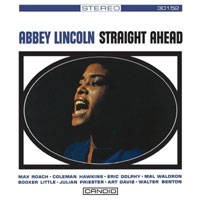Abbey Lincoln • Straight Ahead
Lincoln had an unusual vocal quality, her contralto timbrally rich but a little heavy, even harsh, in a way that could recall Billie Holiday’s roughed-up timbre. Like Holiday she could sell a song, and a lyric -- she’s endearingly earnest. (Lincoln was also a film actor. See Nothing But a Man or For Love of Ivy. She’d been the first choice to play Holiday in what became Lady Sings the Blues.) Abbey wasn’t Billie’s equal; her pitch was not unerring -- maneuvering through these songs she takes a few corners a little wide. But the inspiration was plain, especially on this set, with Holiday’s last pianist Mal Waldron, who co-wrote the album’s jazz art-song title track and “Left Alone” (written with Holiday, who’d sing it but never recorded it). Hawkins’s presence and Holiday’s shadow speak to ways Straight Ahead pulls together far-flung African American cultural strains. There’s a setting of Paul Laurence Dunbar’s 1896 poem “When Malindy Sings,” joyful ode to a neighborhood vocalist no rival can touch, with a fetching pentatonic-ish, minor melody by songwriter Oscar Brown, Jr. (another We Insist collaborator). Pianist Randy Weston and poet Langston Hughes penned the emphatic “African Lady,” where busy hand percussion calls back to Roach’s album (and where Dolphy’s on chattery background piccolo). Priester’s “Retribution,” with Lincoln’s pro-reparations lyric, is in the swingy 5/4 rhythm Roach was grooving on back then. (It wasn’t just Brubeck doing that, and it was a touchy subject, whether he or Roach had done it first.) Lincoln also wrote (iffy) words to Thelonious Monk’s “Blue Monk,” though her relaxed sway is rhythmically sure, and there’s a declamatory solo by Hawkins, Monk’s (and Max’s) old employer. Hawkins’s meat was improvising his way through complex chord sequences. Here, as on Roach’s album, one idea was clearly to push Hawk outside his comfort zone, on melodically oriented material with less involved changes. Sonny Rollins would try something similar on his 1963 date with Hawkins. Could they throw him off? They could not. (He liked Abbey and clearly trusted Max.) Hawk could always get rhapsodic on a ballad -- as on “Left Alone,” which does have good changes. On “Straight Ahead” he glosses the melody, stretching his time; on “African Lady” he tosses one motif around like a beach ball. He even solos on “In the Red,” about poor folks’ financial woes, symbolized by the melody’s slow incremental descent. It's the most self-consciously provocative piece (and, in truth, the one that wears least well), its long note dissonances for horns and voice arranged by Booker Little in a close-interval style that looks ahead to his own newly reissued Candid release Out Front with Dolphy, recorded weeks later. Hawkins’s slithery long tones on his spot reply in kind. Candid’s original two-track stereo session tapes still exist; some earlier Candid
CDs (but not this batch) include alternate takes. (Other, unauthorized editions were
dubbed from LPs.) The original sleeve tells us Straight Ahead was recorded (in
mono and stereo) on Ampex 300s at Midtown Manhattan’s Nola Penthouse Studios, with
Bob d’Orleans at the board and Hentoff supervising. Those albums were well recorded
and mixed, the rhythm section not overly forward. Bernie Grundman is remastering the whole
series from the master tapes, and it’s high compliment to say he hasn’t tried to
put his own stamp on their classic sound. He doesn’t fix what ain’t broke. |

 he most noteworthy item in the first batch of newly
remastered Candid Records -- Nat Hentoff’s short-lived, early-1960s jazz and blues
label -- releases was drummer Max Roach’s Civil Rights shout We Insist! Freedom
Now Suite sung by Abbey Lincoln. Also in that batch is a sequel/spinoff of sorts
recorded six months later. Lincoln’s 1961 Straight Ahead reunites We
Insist’s five horns, including its prestige guest, tenor-saxophone patriarch
Coleman Hawkins, alongside trombonist Julian Priester, and frequently paired outward-bound
trumpeter Booker Little and altoist/flutist Eric Dolphy. Also Art Davis on bass, and Max
himself, the music’s catalyst. Lincoln had been a cocktail-dress, supper-club singer
until she fell in with Roach and began to think of her microphone as an advocate’s
megaphone. She stayed true to composing and singing socially conscious material (among
other songs) ever after, for more than forty years.
he most noteworthy item in the first batch of newly
remastered Candid Records -- Nat Hentoff’s short-lived, early-1960s jazz and blues
label -- releases was drummer Max Roach’s Civil Rights shout We Insist! Freedom
Now Suite sung by Abbey Lincoln. Also in that batch is a sequel/spinoff of sorts
recorded six months later. Lincoln’s 1961 Straight Ahead reunites We
Insist’s five horns, including its prestige guest, tenor-saxophone patriarch
Coleman Hawkins, alongside trombonist Julian Priester, and frequently paired outward-bound
trumpeter Booker Little and altoist/flutist Eric Dolphy. Also Art Davis on bass, and Max
himself, the music’s catalyst. Lincoln had been a cocktail-dress, supper-club singer
until she fell in with Roach and began to think of her microphone as an advocate’s
megaphone. She stayed true to composing and singing socially conscious material (among
other songs) ever after, for more than forty years.